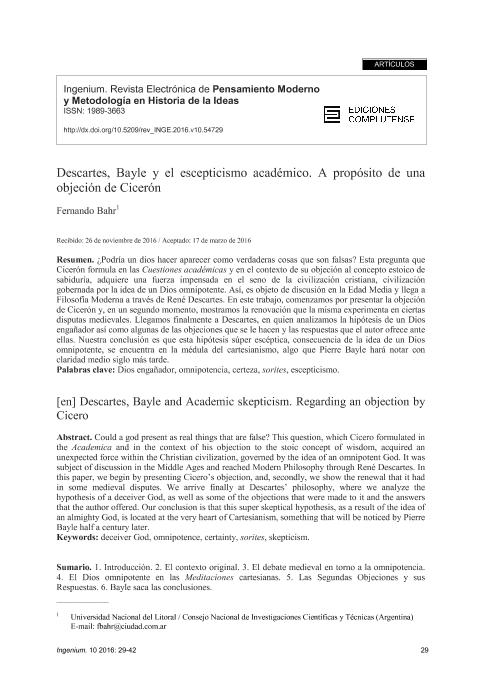Mostrar el registro sencillo del ítem
dc.contributor.author
Bahr, Fernando Anibal

dc.date.available
2018-09-12T18:47:43Z
dc.date.issued
2016-12
dc.identifier.citation
Bahr, Fernando Anibal; Descartes, Bayle y el escepticismo académico : a propósito de una objeción de Cicerón; Universidad Complutense de Madrid; Ingenium; 10; 10; 12-2016; 29-42
dc.identifier.issn
1989-3663
dc.identifier.uri
http://hdl.handle.net/11336/59382
dc.description.abstract
¿Podría un dios hacer aparecer como verdaderas cosas que son falsas? Esta pregunta que Cicerón formula en las Cuestiones académicas y en el contexto de su objeción al concepto estoico de sabiduría, adquiere una fuerza impensada en el seno de la civilización cristiana, civilización gobernada por la idea de un Dios omnipotente. Así, es objeto de discusión en la Edad Media y llega a Filosofía Moderna a través de René Descartes. En este trabajo, comenzamos por presentar la objeción de Cicerón y, en un segundo momento, mostramos la renovación que la misma experimenta en ciertas disputas medievales. Llegamos finalmente a Descartes, en quien analizamos la hipótesis de un Dios engañador así como algunas de las objeciones que se le hacen y las respuestas que el autor ofrece ante ellas. Nuestra conclusión es que esta hipótesis súper escéptica, consecuencia de la idea de un Dios omnipotente, se encuentra en la médula del cartesianismo, algo que Pierre Bayle hará notar con claridad medio siglo más tarde.
dc.description.abstract
Could a god present as real things that are false? This question, which Cicero formulated in the Academica and in the context of his objection to the stoic concept of wisdom, acquired an unexpected force within the Christian civilization, governed by the idea of an omnipotent God. It was subject of discussion in the Middle Ages and reached Modern Philosophy through René Descartes. In this paper, we begin by presenting Cicero’s objection, and, secondly, we show the renewal that it had in some medieval disputes. We arrive finally at Descartes’ philosophy, where we analyze the hypothesis of a deceiver God, as well as some of the objections that were made to it and the answers that the author offered. Our conclusion is that this super skeptical hypothesis, as a result of the idea of an almighty God, is located at the very heart of Cartesianism, something that will be noticed by Pierre Bayle half a century later.
dc.format
application/pdf
dc.language.iso
spa
dc.publisher
Universidad Complutense de Madrid

dc.rights
info:eu-repo/semantics/openAccess
dc.rights.uri
https://creativecommons.org/licenses/by-nc-sa/2.5/ar/
dc.subject
Dios Engañador
dc.subject
Omnipotencia
dc.subject
Certeza
dc.subject
Sorites
dc.subject
Escepticismo
dc.subject.classification
Otras Filosofía, Étnica y Religión

dc.subject.classification
Filosofía, Ética y Religión

dc.subject.classification
HUMANIDADES

dc.title
Descartes, Bayle y el escepticismo académico : a propósito de una objeción de Cicerón
dc.type
info:eu-repo/semantics/article
dc.type
info:ar-repo/semantics/artículo
dc.type
info:eu-repo/semantics/publishedVersion
dc.date.updated
2018-09-11T18:08:58Z
dc.journal.volume
10
dc.journal.number
10
dc.journal.pagination
29-42
dc.journal.pais
España

dc.journal.ciudad
Madrid
dc.description.fil
Fil: Bahr, Fernando Anibal. Consejo Nacional de Investigaciones Científicas y Técnicas; Argentina. Universidad Nacional del Litoral. Instituto de Humanidades y Ciencias Sociales del Litoral. Consejo Nacional de Investigaciones Científicas y Técnicas. Centro Científico Tecnológico Conicet - Santa Fe. Instituto de Humanidades y Ciencias Sociales del Litoral.; Argentina
dc.journal.title
Ingenium
dc.relation.alternativeid
info:eu-repo/semantics/altIdentifier/doi/http://dx.doi.org/10.5209/rev_INGE.2016.v10.54729
dc.relation.alternativeid
info:eu-repo/semantics/altIdentifier/url/http://revistas.ucm.es/index.php/INGE/article/view/54729
dc.relation.alternativeid
info:eu-repo/semantics/altIdentifier/url/https://dialnet.unirioja.es/servlet/articulo?codigo=6126295
Archivos asociados
